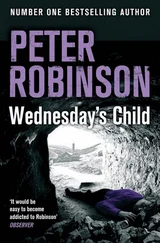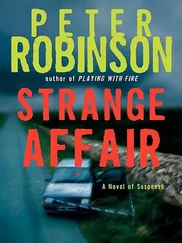Leanne was an average pupil, so her teachers said. She could probably do better if she tried harder, but she didn’t want to make the effort. She intended to leave school at the end of the year and get a job, maybe in a clothes shop or a music shop like Virgin or HMV. She loved pop music, and her favorite group was Oasis. No matter what people said about them, Leanne was a loyal fan. Her friends thought her a rather shy but easygoing person, quick to laugh at people’s jokes and not given much to introspection. She also suffered from mild asthma and carried an inhaler, which had been found along with the rest of her personal things in the abandoned shoulder bag.
If the second victim, Samantha Foster, was a little eccentric, Leanne Wray was about as ordinary a lower-middle-class Yorkshire lass as you could get.
“Yeah, I’m all right to talk, sir. Really. Come on in.”
PC Janet Taylor didn’t look all right to Banks when he called at her flat after six that evening, but then anyone who had, that morning, both fought off a serial killer and cradled her dying partner’s head on her lap had every right to look a bit peaky. Janet was pale and drawn, and the fact that she was dressed all in black only served to accentuated her pallor.
Janet’s flat was above a hairdresser’s on Harrogate Road, not far from the airport. Banks could smell the setting lotion and herbal shampoo inside the ground-floor doorway. He followed her up the narrow staircase. She moved listlessly, dragging her feet. Banks felt almost as weary as Janet seemed. He had just attended Kimberley Myers’s postmortem, and while it had yielded no surprises – death by ligature strangulation – Dr. Mackenzie had found traces of semen in the vagina, anus and mouth. With any luck, DNA would link that to Terence Payne.
Janet Taylor’s living room showed signs of neglect typical to a single police officer’s dwelling. Banks recognized it all too well. He tried to keep his own cottage clean as best he could, but it was difficult sometimes when you couldn’t afford a cleaning lady and you didn’t have time yourself. When you did have a bit of free time, the last thing you wanted to do was housework. Still, the small room was cozy enough despite the patina of dust on the low table and the T-shirt and bra slung over the back of the armchair, the magazines and occasional half-empty teacups. There were three framed posters of old Bogie movies on the walls – Casablanca, The Maltese Falcon and The African Queen – and some photos on the mantelpiece, including one of Janet looking proud in her uniform, standing between an older couple Banks took to be her mother and father. The potted plant on the windowsill looked to be on its last legs, wilting and brown around the edges of the leaves. A television set flickered in one corner, the sound turned down. It was a local news program, and Banks recognized the scene around the Payne house.
Janet moved the T-shirt and bra from the back of the armchair. “Sit down, sir.”
“Can we have the sound on for a minute?” Banks asked. “Who knows, maybe we’ll learn something.”
“Sure.” Janet turned the volume up, but all they got was a repeat of AC Hartnell’s earlier press statement. When it was over, Janet got up and turned off the TV. She still seemed slow in her movements, slurred in her speech, and Banks imagined it was something to do with the tranquilizers the doctor would have given her. Or maybe it was the half-empty bottle of gin on the sideboard.
A plane took off from Leeds and Bradford Airport, and while the noise didn’t actually shake the flat, it was enough to rattle a glass and make conversation impossible for a minute or so. It was also hot in the small room, and Banks felt the sweat gather on his forehead and under his arms.
“It’s why the place is so cheap,” Janet said after the noise had waned to a distant drone. “I don’t mind it that much. You get used to it. Sometimes I sit here and imagine I’m up there in one of them, flying off to some exotic country.” She got up and poured herself a small gin, adding some tonic from an open bottle of Schweppes. “Fancy a drink, sir?”
“No, thanks. How are you coping?”
Janet sat down again and shook her head. “The funny thing is, I don’t really know. I’m all right, I suppose, but I feel sort of numb, as if I’ve just come around from an anesthetic and I’m still all padded in cotton wool. Or like I’m in a dream and I’m going to wake up tomorrow morning and everything will be different. It won’t, though, will it?”
“Probably not,” said Banks. “It might even be worse.”
Janet laughed. “Well, thanks for not giving me a load of bollocks.”
Banks smiled. “My pleasure. Look, I’m not here to question your actions, but I need to know what happened in that house. Do you feel up to talking about it?”
“Sure.”
Banks noticed her body language, the way she crossed her arms and seemed to draw in on herself, and guessed that she wasn’t up to it, but he had to press on nonetheless.
“I felt like a criminal, you know,” she said.
“What do you mean?”
“The way the doctor examined me, bagged my clothes, scraped under my fingernails.”
“It’s routine. You know it is.”
“I know. I know. That’s not what it feels like on the receiving end, though.”
“I suppose not. Look, I’m not going to lie to you, Janet. This could be a serious problem. It could be over in no time at all, a minor bump in the road, but it could stick around, cause you problems with your career-”
“I think that’s pretty much over, don’t you, sir?”
“Not necessarily. Not unless you want it to be.”
“I must admit I haven’t given it a lot of thought since… you know.” She gave a harsh laugh. “Funny thing is, if this was America, I’d be a hero.”
“What happened when you first received the call?”
Janet told him about the car fire and the call and finding Lucy Payne unconscious in the hallway in short, halting sentences, occasionally pausing for a sip of gin and tonic, once or twice losing her thread and staring toward the open window. Sounds of evening traffic came up from the busy road and occasionally a plane landed or took off.
“Did you think she was seriously hurt?”
“Serious enough. Not life-threatening. But I stayed with her while Dennis checked around upstairs. He came back with a blanket and a pillow, I remember that. I thought that was nice of him. It surprised me.”
“Dennis wasn’t always nice?”
“It’s not a word I’d use to describe him, no. We disagreed a lot, but I suppose we got on okay. He’s all right. Just a bit of a Neanderthal. And full of himself.”
“What did you do next?”
“Dennis went in back, the kitchen. I mean, someone had hit her, and if it was her husband, the odds were he was still in the house somewhere. Right? Probably feeling sorry for himself.”
“You stayed with Lucy?”
“Yes.”
“Then what happened?”
“Dennis called me, so I left her. She was as comfortable as I could make her, with the blanket and the pillow. The bleeding had pretty much stopped. I didn’t think she was in any real danger. The ambulance was on its way…”
“You didn’t sense any danger in the house?”
“Danger? No, not at all. I mean, no more than you do in any domestic. They can turn on you. It’s happened. But no.”
“Okay. What made you go down to the cellar? Did you think her husband might be there?”
“Yes, I suppose we must have.”
“Why did Dennis call you?”
Janet paused, clearly embarrassed.
“Janet?”
Finally she looked at him. “You’ve been there? Down the cellar?”
“Yes.”
Читать дальше












